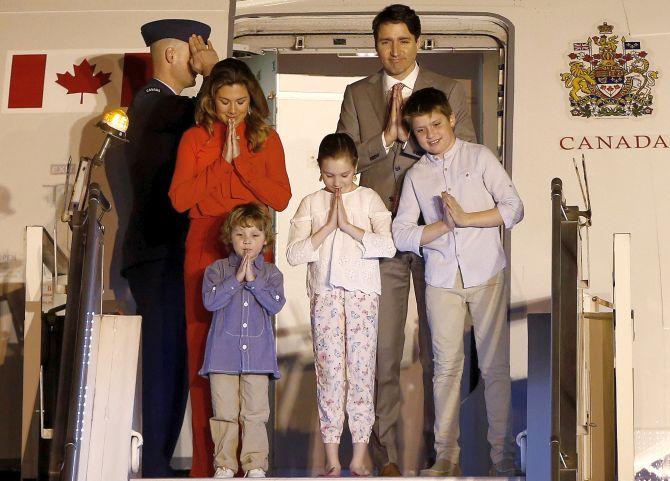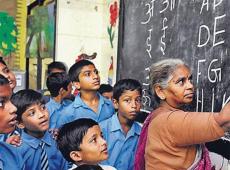Canada Caps International Student Visas: Impact on Indians
By Rediff Money Desk, OTTAWA Jan 23, 2024 10:51
Canada imposes a 2-year cap on new international student visas, impacting Indians seeking higher education. The move aims to address housing crisis and target 'bad actors'.

Ottawa, Jan 23 (PTI) Canada has announced that it is imposing an immediate two-year cap on new international student visas to tackle a housing crisis and target institutional "bad actors", a move that is likely to impact Indians planning to study in the country.
Immigration Minister Marc Miller said as part of the cap there will be a 35 per cent reduction in new study visas in 2024. The cap is expected to result in 364,000 new approved permits in 2024. Nearly 560,000 such visas were issued last year.
The cap will be in place for two years; the number of permits to be issued in 2025 will be reassessed at the end of this year, he said.
To maintain a sustainable level of temporary residence in Canada, as well to ensure that there is no further growth in the number of international students in Canada for 2024, we are setting a national application intake cap for two years from 2024, Global News quoted Miller as saying.
The move comes amid pressure on the federal government from provinces on the increasing numbers of non-permanent residents entering Canada while the country struggles with a housing crisis, CBC News said.
Miller earlier this month said that a cap on international students would not be a one-size-fits-all solution to housing shortages across Canada.
More than 800,000 international students were issued temporary study visas in 2022. Miller said last fall that 2023's numbers were on track to be more than triple the number accepted 10 years ago.
The move is expected to impact students from India who see Canada as a preferred destination for higher studies.
India was the first among the top ten origin countries of study permit holders in 2022 in Canada, with a total of 319,000 students.
Miller said that by imposing the cap, the federal government is taking action against some small private colleges.
The move will help the government to target institutional "bad actors", he said.
"It's unacceptable that some private institutions have taken advantage of international students by operating under-resourced campuses, lacking supports for students and charging high tuition fees all the while significantly increasing their intake of international students," Miller said.
In some provinces, Miller said, the total reduction in permits will be approximately 50 per cent.
Provinces and territories will be left to decide how permits are distributed among universities and colleges in their jurisdictions. The cap will be in place for two years; the number of permits to be issued in 2025 will be reassessed at the end of this year.
In an interview with CBC News on Monday, Miller spoke of "degree-granting institutions that are giving fake business degrees" to students who hope to stay in Canada. The minister said there could be "hundreds" of such schools operating in Canada and that the number has "exploded in the last couple of years."
In addition to the cap, the federal government will also require international students applying for a permit to provide an attestation letter from a province or territory.
"These measures are not against individual international students," Miller said.
"They are to ensure that as future students arrive in Canada, they receive the quality of education that they signed up for and the hope that they were provided in their home countries."
Miller also announced changes to the post-graduation work permit programme.
Starting in September, international students who begin a programme that's part of a curriculum licensing arrangement (one where a private college has been licensed to deliver the curriculum of an associated public college) will no longer be eligible for a post-graduation work permit.
Graduates of master's and other "short graduate-level programmes" will "soon" be able to apply for a three-year work permit, the government says. Open work permits will also be made available to the spouses of international students in master's and doctoral programs.
The changes announced Monday come a little over a month after Miller first announced measures intended to target what the minister described as "the diploma equivalent of puppy mills."
Conservative Leader Pierre Poilievre said the blame lies entirely with Prime Minister Justin Trudeau and called the prime minister "incompetent."
"He is the one that granted the study permits. That is a federal responsibility," Poilievre said.
Jenny Kwan, the New Democratic Party leader, also blamed Trudeau's "mismanagement."
She also warned that the new cap "might punish talented students who seek to build a better life."
In a media statement, Ontario's Minister of Colleges and Universities Jill Dunlop said her government recognises that "some bad actors are taking advantage of these students with false promises of guaranteed employment, residency and Canadian citizenship."
The minister said Ontario has been engaging with the federal government on "ways to crack down on these practices, like predatory recruitment."
A statement issued by Nova Scotia's department of advanced education said the province "will need to assess the impacts of the changes made by the federal government once we have more details, including provincial allocations.
Immigration Minister Marc Miller said as part of the cap there will be a 35 per cent reduction in new study visas in 2024. The cap is expected to result in 364,000 new approved permits in 2024. Nearly 560,000 such visas were issued last year.
The cap will be in place for two years; the number of permits to be issued in 2025 will be reassessed at the end of this year, he said.
To maintain a sustainable level of temporary residence in Canada, as well to ensure that there is no further growth in the number of international students in Canada for 2024, we are setting a national application intake cap for two years from 2024, Global News quoted Miller as saying.
The move comes amid pressure on the federal government from provinces on the increasing numbers of non-permanent residents entering Canada while the country struggles with a housing crisis, CBC News said.
Miller earlier this month said that a cap on international students would not be a one-size-fits-all solution to housing shortages across Canada.
More than 800,000 international students were issued temporary study visas in 2022. Miller said last fall that 2023's numbers were on track to be more than triple the number accepted 10 years ago.
The move is expected to impact students from India who see Canada as a preferred destination for higher studies.
India was the first among the top ten origin countries of study permit holders in 2022 in Canada, with a total of 319,000 students.
Miller said that by imposing the cap, the federal government is taking action against some small private colleges.
The move will help the government to target institutional "bad actors", he said.
"It's unacceptable that some private institutions have taken advantage of international students by operating under-resourced campuses, lacking supports for students and charging high tuition fees all the while significantly increasing their intake of international students," Miller said.
In some provinces, Miller said, the total reduction in permits will be approximately 50 per cent.
Provinces and territories will be left to decide how permits are distributed among universities and colleges in their jurisdictions. The cap will be in place for two years; the number of permits to be issued in 2025 will be reassessed at the end of this year.
In an interview with CBC News on Monday, Miller spoke of "degree-granting institutions that are giving fake business degrees" to students who hope to stay in Canada. The minister said there could be "hundreds" of such schools operating in Canada and that the number has "exploded in the last couple of years."
In addition to the cap, the federal government will also require international students applying for a permit to provide an attestation letter from a province or territory.
"These measures are not against individual international students," Miller said.
"They are to ensure that as future students arrive in Canada, they receive the quality of education that they signed up for and the hope that they were provided in their home countries."
Miller also announced changes to the post-graduation work permit programme.
Starting in September, international students who begin a programme that's part of a curriculum licensing arrangement (one where a private college has been licensed to deliver the curriculum of an associated public college) will no longer be eligible for a post-graduation work permit.
Graduates of master's and other "short graduate-level programmes" will "soon" be able to apply for a three-year work permit, the government says. Open work permits will also be made available to the spouses of international students in master's and doctoral programs.
The changes announced Monday come a little over a month after Miller first announced measures intended to target what the minister described as "the diploma equivalent of puppy mills."
Conservative Leader Pierre Poilievre said the blame lies entirely with Prime Minister Justin Trudeau and called the prime minister "incompetent."
"He is the one that granted the study permits. That is a federal responsibility," Poilievre said.
Jenny Kwan, the New Democratic Party leader, also blamed Trudeau's "mismanagement."
She also warned that the new cap "might punish talented students who seek to build a better life."
In a media statement, Ontario's Minister of Colleges and Universities Jill Dunlop said her government recognises that "some bad actors are taking advantage of these students with false promises of guaranteed employment, residency and Canadian citizenship."
The minister said Ontario has been engaging with the federal government on "ways to crack down on these practices, like predatory recruitment."
A statement issued by Nova Scotia's department of advanced education said the province "will need to assess the impacts of the changes made by the federal government once we have more details, including provincial allocations.
Read More On:
DISCLAIMER - This article is from a syndicated feed. The original source is responsible for accuracy, views & content ownership. Views expressed may not reflect those of rediff.com India Limited.
You May Like To Read
TODAY'S MOST TRADED COMPANIES
- Company Name
- Price
- Volume
- IFL Enterprises
- 1.36 (+ 4.62)
- 96270207
- Franklin Industries
- 3.90 (+ 4.56)
- 27501642
- Vodafone Idea L
- 16.18 ( -3.63)
- 21311560
- Indian Renewable
- 259.90 ( -4.54)
- 14228151
- AvanceTechnologies
- 0.90 ( -1.10)
- 11518579
MORE NEWS

Wipro Transfers Stake in Financial Outsourcing...
Wipro Holdings (UK) has transferred its entire stake in Wipro Financial Outsourcing...

Indian Markets Turn Negative After Record Highs
Indian stock markets experienced volatility on Thursday, turning negative after...
ASK Property Fund Invests Rs 190 Cr in...
ASK Property Fund has invested Rs 190 crore in a real estate project being developed by...












 © 2024 Rediff.com India Limited. All rights reserved.
© 2024 Rediff.com India Limited. All rights reserved.